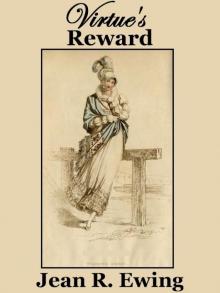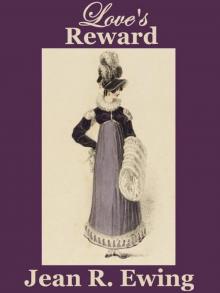- Home
- Jean R. Ewing
Virtue's Reward Page 4
Virtue's Reward Read online
Page 4
“I had a very uninteresting upbringing, Captain.”
“Yet if the books in your father’s library are anything to go by, you did not lack for mental stimulation.” He smiled as she gave him a surprised look. “Forgive me,” he said. “I nosed around shamelessly while you were packing. Did you read all that stuff?”
Helena was forced to laugh. “Most of it! There was nothing else on long winter evenings.”
“Good God!” he said with a grin. “I’m marrying a bluestocking.”
“I refuse to believe that you haven’t read the classics yourself, sir.”
“Yet I ran away from school several times, and a knowledge of Ovid and Homer wasn’t in the least use in my later career.”
At last, the opening she wanted. “Have you always been a soldier?”
The black eyes surveyed her with considerable amusement. “Like Jonah, fishing? No, I have not, but I have always retained an appreciation for Homer.”
And he adroitly turned the subject to a discussion of poetry.
As they traveled into the long summer twilight, Helena discovered that Captain Acton could be an extremely fascinating companion. Little by little, she became more entranced. He was more than widely read—he put her knowledge of literature to shame. They were debating the merits of Lord Byron’s work, when he suddenly leaned forward and rapped on the panel. Instantly the carriage swayed to a halt.
“Why are we stopping?” Helena asked.
“Because the sun is setting, dear Miss Trethaerin.”
He leaped from the coach and held open the door for her. Helena stepped down. The highway ran along the high central spine of Cornwall. Open moor and stone-fenced fields dropped away on both sides of the road. In the west, in a glory of blazing color, the sun was sinking over the horizon.
Captain Acton laughed. It was a sound of pure delight, with no hint of that underlying shadow. He grasped the brass handles at the side of the carriage and swung himself up to stand beside the astonished coachman. He stood for a moment, silhouetted against the sky, a slight breeze ruffling his bright hair. Helena gazed up at him. Something strange and dangerous twisted at her heart.
The coachman climbed down to stand at the horses’ heads.
“Come,” Captain Acton said, reaching a hand down to her. “It’s stunning from up here.”
The clean, strong bones of his wrist beneath his shirt cuff were highlighted by clear shadows in the fading light. Their pure beauty pierced her to the heart.
She hesitated. “I told you I had a very staid upbringing, Captain Acton. I’m not used to climbing on carriages.”
He laughed. “You will be quite safe. No harm will come to you at my hands, I assure you. Do you know, I could never resist such a sunset.” He gave her a wicked smile. “Once in Africa—”
“You were in Africa?” Helena asked.
“Come up and I’ll tell you.”
She held up her hands and he grasped them. His lean fingers easily took her weight, and in the next instant she was beside him. He put an arm about her waist to steady her.
“North Africa. I thought it would improve my education if I traveled all around the Mediterranean.”
“And did it?”
“It certainly improved my appreciation for my homeland.”
“But you have been away for so long—seven or eight years, you told me.”
“The education took a while to sink in. I’m a dreadfully slow learner, you see. Africa was the first lesson.”
And then he created a compelling, shining picture of that year of his life: of camels, of Bedouin, of pyramids. Yet she had no clear idea of what he was doing there, and the fact that it had been a dangerous mission was one she had to glean between the words. As he told it, North Africa was only a charming, amusing adventure.
“It was a great disadvantage to be fair,” he finished with a grin. “Now, hush, and let the sunset do its work.”
They stood together as the colors deepened and streamed across the sky. His breathing was steady and reassuring at her back. His arm tightened just a little, holding her against his firm chest. Helena had never felt so safe. She wanted desperately to lean into his strength. Yet she wasn’t used to being touched. It had been years, hadn’t it, since her childhood nurse had cuddled her on a warm lap?
“There! It goes,” Captain Acton said. “Now we must hurry or we’ll not reach Bodmin before dark. I have told you one of my adventures. Now you must tell me tales of Cornwall. Were there ever smugglers at Trethaerin House?”
The spell was broken. He helped Helena down off the carriage and back to her seat. Half an hour later they rattled into the inn yard at the Dog and Raven. The innkeeper showed her to a room and she was sent up supper on a tray. Of her prospective bridegroom she saw no further sign.
Restlessly, she paced about for a while. Captain Richard Acton was undeniably attractive, yet what had she learned? He liked books. He had traveled. Meanwhile, she was uncomfortably aware that she had been gently but thoroughly manipulated. She had been so entertained that she had not had time to grieve for her childhood home, nor to give a moment’s thought to what she was about to do, but he had revealed nothing more of himself than was exactly calculated to reassure her.
The realization of quite how skillfully he had managed to prevent her finding out more about him, however, had quite the opposite effect. What would her future bring if she married him? Would she be a pawn in the hands of this fascinating man while he kept himself forever safeguarded against her? What could she offer him in return? She knew nothing of the world and less of marriage. Surely there were other alternatives?
Of course, she admitted at last to herself, she ought to have sought work as a governess as soon as Mr. Marble first explained things. It might have been possible if she had acted right away, even though she had no references and it would have guaranteed a bleak future. But she had waited too long, the chance slipping further and further away with each passing day.
Now, instead, she had impulsively committed herself to a life with a man she didn’t know.
He is lovely, yes, but he has secrets. Deep, deep, secrets—and a habit of keeping them. It’s hard to say, she thought ruefully, where bravery stops and folly starts.
She fell into bed at last, only to dream of Trethaerin Cove. Edward stood far out on the rocks, dressed as Admiral Lord Nelson. He was smiling and waving to her as if he had a message. The roar of the surf drowned out his words.
She thought about it when she awoke in the morning. Dear Edward! In truth she couldn’t really remember what he looked like.
Yet she was prepared to marry Captain Richard Acton because Edward had worshipped him.
* * *
The next day they reached Exeter. At a major posting house Helena was installed in a private suite. She had a suspicion that it might be the best in the house. Perhaps Captain Acton was fairly well heeled, if he could afford such accommodation. It was more than extraordinary that she still didn’t know.
After she finished her light meal, someone knocked on the door. She answered, then bit her lip. It was not the maid. Instead, Captain Acton—tall, elegant, rather too devastatingly good-looking—strode into the room.
He sat down at the table opposite her.
“Are you fatigued?” he asked simply.
“Not particularly, why?”
“Because I think we should marry right away. I set about procuring a special license before I came to Trethaerin.”
Helena swallowed hard. Could she really go through with it?
“Then you were very sure of yourself, sir.”
He smiled. “Just a contingency. It didn’t have to be acted upon.”
“But now you think that it should?”
“What do you take me for? We can hardly continue to travel together unless we are man and wife.”
“Of course. I didn’t mean to suggest otherwise.” Rising panic robbed her of breath. Her heart thundered. What was she about to do? “Captain Acton
. If you wish to change your mind, it isn’t too late.”
“You think I should abandon you in Exeter, after bringing you up from Cornwall alone?”
“I was at school here. Perhaps they would give me a post as a teacher.”
“When you turn up unchaperoned at the door? It won’t wash, my dear.”
“But I wouldn’t hold you to such a Banbury arrangement as this marriage, Captain Acton, if you should wish otherwise.”
He grinned. “I do not wish otherwise. I thought Edward had told you all of my faults? Changing my mind isn’t one of them; nonsense poems are.” His laugh seemed filled with a lighthearted good humor. It was better than any testimonial. “Good Lord! Relax, dear lady! I thought you learned from your cousin Edward that I was a renowned buffoon and completely harmless. Must I prove it? ‘There once was a soldier who sighed / To the lady he took as his bride / They will never believe—’ I can’t tell you the rest. Until after we’re married, of course.”
Helena was forced to laugh. “You think I should marry you to hear the end of a shocking verse, Captain?”
“It’s not sufficient incentive? Then how about this one? ‘The lady who came up from Bath—’ No, that’s even worse. I am lost to decent society. Unless you save me, Miss Trethaerin, I shall be forever confined to a soldier’s barren life.”
“Then you are determined on this match, Captain?”
Her panic unaccountably shifted, choking, as if to mock her earlier doubts. What if he should say no, after all? Where could she go?
In the next moment, she was able to breathe again.
“Of course, or I would never have suggested it. Miss Trethaerin, we are both rational people. We expect nothing more from each other than courtesy. It seems to me to be a far sounder basis for a marriage than blind passion. You’re the one who has second thoughts. Very well, sleep on it. We can be wed in the morning, but if you truly can’t go through with it, I shall send you back with the chaise to Trethaerin.”
And Nigel Garthwood.
* * *
The following morning Helena dressed in her best blue-and-white sprigged muslin, and married Captain Richard Acton in St. George’s church, with strangers as witnesses. As soon as the vicar finished the simple service, her new husband led her out onto the porch.
She turned to him and held out her hand.
“I feel that I should at least offer you some acknowledgment, sir, for rescuing me from the lion’s den.”
“It is more customary, my dear, to kiss the bride, than it is to shake hands.”
Very gently he pulled her to him and cupped her chin in his fingers. His thumb traced the line of her upper lip before he lowered his mouth and let his lips move briefly against hers. The touch was fleeting, courteous, and flooded her body with honey. She had never felt anything like it before.
Oh, Lord! She had been more than naïve.
It had not occurred to her until that instant that he might expect her to be more than a platonic companion. But of course he would require her to do her duty in the marriage bed and provide him with children. Helena had little idea what such duties entailed, but she knew they were supposed to be unpleasant. How could she have been so foolish as to not get this delicate issue clear?
Now it was too late. They were man and wife.
Chapter Four
Nigel Garthwood leaned back in the comfortable chair by the fireplace at Friarswell and gazed up at a portrait on the wall. It was that of a certain Sir Edmund Blake, grandfather of the late Edward and brother to his own grandmother, Clara. When Miss Blake had run off with John Garthwood, Sir Edmund had struck her name from the family Bible. There was not a portrait of her in the house. Yet their marriage had been legitimate and the laws of inheritance still held.
“Well, Sir Edmund,” he said aloud with a smile. “The Garthwoods have their own back. It is Clara’s progeny who rules the roost now. A toast to Clara and John Garthwood!”
It had been a younger sister who had married a Trethaerin and thus Helena had lost out. He thought about her fleetingly. It had both surprised and annoyed him when she had announced her intention to marry that Acton fellow, who had sprung apparently from nowhere, but he was not unduly distressed.
In fact, it was perhaps more convenient than marrying her himself. Either way, she was now out of his way at Trethaerin House and he could pursue his own plans for the place.
He turned the glass of fine French brandy in his hand and smiled. Yes, it was undoubtedly better this way. Helena Trethaerin had possessed far too sharp a tongue and too precious a sensibility. She would have been appalled to find out how he intended to use her childhood home.
Nigel Garthwood took a long swallow of brandy and winked crudely at the portrait.
* * *
Helena looked at the well-sprung curricle in amazement. A pair of perfectly matched grays stood harnessed and ready to go. From somewhere, two tigers had been hired. One stood at the horses’ heads and the other was standing at attention, ready to let down the steps for her.
“Where did all this come from?” she asked.
Richard looked at her and raised a brow. “I bought it.”
“You bought it? But how?”
“With money, dear wife. I can hardly bring you to King’s Acton in a hired chaise with job horses.”
She blushed uncomfortably. “King’s Acton?”
“My father’s place. It’s on our way. We should stop there and pay our respects, don’t you think?”
“I’m to meet your parents? Today?”
“Of course, what did you imagine? That I would hide you away? I do have a family, you know.”
He must have, of course. In her hurry at Trethaerin, she hadn’t even thought to ask him. And then he had not been exactly forthcoming about himself after that.
“Aren’t we going to London?” she asked faintly.
He looked mildly surprised. “Later, perhaps. First I intend to show my father that I have done my duty and entered holy wedlock.”
Her new husband handed her up into the curricle, then swung in beside her and took the ribbons. Bayard was tied on behind and they set off.
It was a clear, beautiful day. As they left Devon and crossed into Somerset, she was entering a part of England she had never seen before. The landscape was steadily becoming softer and greener. The village houses began to be roofed in thatch, instead of the gray slate of her native Cornwall. There was no hint of the sea in these mellow lanes and snug cottages. The fields boasted thick thorn hedges. There were no more drystone walls and windblown gorse bushes.
Just after Ilminster, they left the turnpike and began to travel south. The road took another sharp turn east and the curricle swept through a pair of iron gates flanked by huge stone pillars. The gatekeeper gave them a gap-toothed grin and doffed his cap as they passed. The gatehouse alone was large enough to serve as any respectable gentleman’s country seat.
The horses trotted on up a driveway that passed between rows of perfectly manicured laurel and rhododendron.
“For heaven’s sake, sir,” Helena said. “What on earth is this place? Is your father some kind of potentate?”
“Of course not. He’s the Earl of Acton.”
“What? Your father is an earl?” Helena’s hand flew to her heart in a vain attempt to steady its wild beating. She felt almost faint. “How could you not have told me?”
He gave her an odd smile. “Would you have turned me down if you had known?”
“Good heavens, sir! I thought we were to be honest with each other. Don’t you think I had the right to know?”
She knew he was prevaricating when he replied. “To be truthful, I didn’t even think of it. I suppose I owe you an apology. Does the thought discompose you?”
“It strikes terror into my very soul. How dared you not make this clear? You are a younger son, I trust?”
“I’m sorry to disabuse you. I am, alas, the heir. You will be a countess someday.”
Helena did her be
st to steady her voice. “Are you also an only child?”
Richard was gazing straight ahead over the horses’ ears. “I have a gaggle of younger siblings who are variously scattered among schools and colleges. Should anything happen to me, Henry could come down from Oxford and make a perfectly good earl, if he ever gets sober enough. Should he also be struck down before his time, however, then John will do just fine. There are also enough little sisters to rattle anybody. They attend a select academy for young ladies near London.”
His voice was perfectly controlled. Was it just her imagination that she detected some trace of bitterness or sarcasm there?
The shrubbery opened up and King’s Acton lay before her. Helena ruthlessly crushed her uprising of panic. Row upon row of tall windows marched across an endless white façade. A battalion of ornamental stone spires punctuated the skyline in matching order. Carved stone medallions paraded below them, each engraved with some heraldic symbol. The front entrance would have been dwarfed by its crenellated portico had there not been an equally imposing flight of stone steps leading up to the door. Surely they were not going to live here?
“My grandfather had delusions of grandeur,” Richard said dryly. “What do you think of his fantasy?”
She felt faint. “I suppose it’s magnificent.”
“You are trying without success to be tactful, my dear. When it becomes mine, I might well burn it down.”
“You can’t be serious?”
She was to have no reply. They had pulled up before the sweep of steps. Bewigged servants in livery appeared like ants from a disturbed mound. Richard handed her down. The curricle was efficiently whisked away. She clung blindly to her husband’s arm as he led her up to the grandiose entrance. The doors opened and closed behind them. Footmen bowed silently. Their hats and gloves disappeared.
Swallowing hard, Helena glanced around. The ceiling of the hallway arched away above her head. Everything was white stone. Marble statues of Greek gods stood on tall stone platforms. Classical urns graced a row of niches at each side of the room. In front of her, two branches of a grand stairway swept in graceful arcs to the floor above.

 Rogue's Reward
Rogue's Reward Scandal's Reward
Scandal's Reward Valor's Reward
Valor's Reward Folly's Reward
Folly's Reward Virtue's Reward
Virtue's Reward Love's Reward
Love's Reward